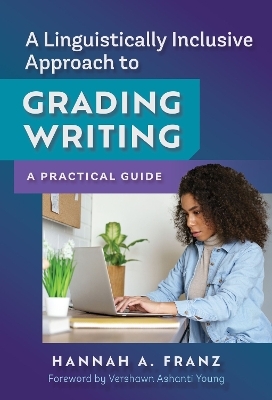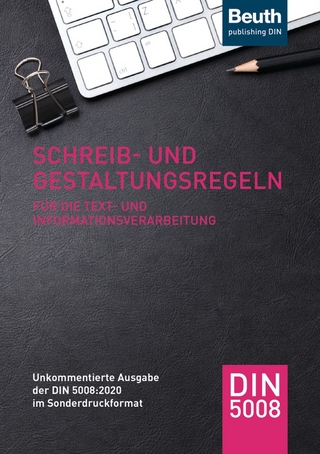
A Linguistically Inclusive Approach to Grading Writing
Teachers' College Press (Verlag)
978-0-8077-6932-4 (ISBN)
- Lieferbar (Termin unbekannt)
- Versandkostenfrei innerhalb Deutschlands
- Auch auf Rechnung
- Verfügbarkeit in der Filiale vor Ort prüfen
- Artikel merken
Book Features:
A linguistically inclusive approach to grading and offering feedback on language variation in college-level writing.
Explanations, with examples, for how to use a linguistically inclusive grading approach across contexts and instructor goals.
Concrete tools and adaptable models for responding to student writing for both formative and summative assessment, even when your students are using ChatGPT.
An approach that not only prevents grading bias, but also effectively guides students to make their own rhetorical choices.
Summary lists of recommended practices and questions for instructors to self-assess their instruction.
A companion suite of resources, Students' Right to Their Own Writing, is available at srtow.org.
Hannah A. Franz is the program associate for graduate advisement at the Jack Kent Cooke Foundation, and a co-author of The Indispensable Guide to Undergraduate Research: Success in and Beyond College.
Contents (final)Foreword Vershawn Ashanti Young vii
Acknowledgments xiii
1. Introduction to a Linguistically Inclusive Approach to Grading Writing 1
Language Variation and a Linguistically Inclusive Approach to Grading Writing 2
The Time It Takes to Grade 3
What Motivated Me to Write This Book 4
Sociolinguistic Concepts That Inform This Book 6
The Benefits of a Linguistically Inclusive Approach to Grading 8
Is a Linguistically Inclusive Grading Approach for Me? 10
Multicultural Education and Culturally Sustaining Pedagogy 13
The Significance of Grades 17
Historical Context of Grading Writing 20
Study Backdrop 22
Companion Resources 22
Overview of the Book 23
Self-Assess Your Practices 242. Curriculum and Instruction for a Linguistically Inclusive Grading Approach 25
Course Objectives in Support of Linguistically Inclusive Grading 25
Instructor Motivations and Linguistically Inclusive Grading 30
Instruction in Organization and Grammar 34
Assignment Goals and Language Variation 39
Audience 41
Self-Assess Your Practices 44
Linguistically Inclusive Practices 453. Linguistically Inclusive Grading Processes 46
Consider Grading Priorities and Distribution 46
Align Grading Priorities With Instruction 48
Read for Student Meaning 51
Use and Explain Sociolinguistically Informed Grading Criteria 52
Word Grading Criteria Positively 56
Maximize Peer Feedback and Multiple Drafts 57
Pose Questions Rather Than Penalties 60
Self-Assess Your Practices 60
Linguistically Inclusive Practices 614. Linguistically Inclusive Commenting Strategies 63
Reapportion Your Time 64
Use Feedback as a Conversation 65
Teach Through Specific Positive Comments 66
Communicate High Expectations 69
Highlight Your Subjectivity as a Reader and Acknowledge Multiple Audiences 71
Ask Strategic Questions 73
Contextualize Prescriptive Comments 74
Rethink Labels 77
Use Corrections Judiciously 79
Self-Assess Your Practices 81
Linguistically Inclusive Practices 825. Organization and Word Choice 84
Organization and Topic Relationships 85
Respond to Organization and Topic Relationships in a Linguistically Inclusive Approach 88
Pronoun Choice 92
Respond to Pronoun Choice in a Linguistically Inclusive Approach 94
Formal and Informal Word Choice 96
Respond to Formal and Informal Word Choice in a Linguistically Inclusive Approach 98
Self-Assess Your Practices 100
Linguistically Inclusive Practices 1006. Grammar and Mechanics 102
What Exactly Are Grammar and Mechanics? 102
Grammar Patterns 104
Respond to Grammar Patterns in a Linguistically Inclusive Approach 108
Mechanical Features 113
Self-Assess Your Practices 116
Linguistically Inclusive Practices 1177. Putting It All Together 119
A Linguistically Inclusive Approach to Grading: Summarized 120
Application of Multicultural Education and Culturally Sustaining Pedagogy 122
What Can a Linguistically Inclusive Grading Approach Look Like in Your Classroom? 123
Conclusion 131References 132
Index 140
About the Author 145
| Erscheinungsdatum | 31.05.2024 |
|---|---|
| Verlagsort | New York |
| Sprache | englisch |
| Maße | 156 x 229 mm |
| Themenwelt | Schulbuch / Wörterbuch ► Wörterbuch / Fremdsprachen |
| Geisteswissenschaften ► Sprach- / Literaturwissenschaft ► Literaturwissenschaft | |
| Geisteswissenschaften ► Sprach- / Literaturwissenschaft ► Sprachwissenschaft | |
| Sozialwissenschaften ► Pädagogik ► Erwachsenenbildung | |
| ISBN-10 | 0-8077-6932-0 / 0807769320 |
| ISBN-13 | 978-0-8077-6932-4 / 9780807769324 |
| Zustand | Neuware |
| Haben Sie eine Frage zum Produkt? |
aus dem Bereich


